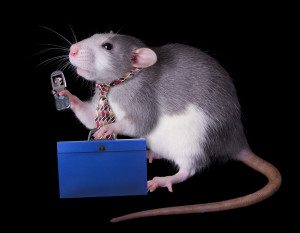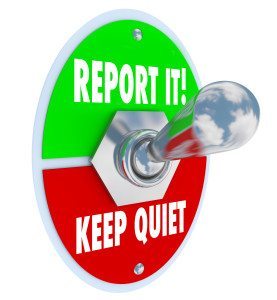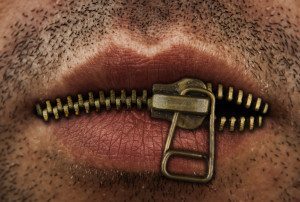
“Never rat out your friends. And always keep your mouth shut.” – Robert De Niro, GoodFellas
I am of Sicilian ancestry, raised in an Italian household in an Italian neighborhood in Brooklyn. Despite this upbringing, it was not until I was an adult when I first learned about the “Code of Silence” known as “omertà.” I learned that “the Code” traced its roots to the 16th century. For Sicilians, the Code meant to never, for any reason, seek help from or cooperate with government authorities. If you witnessed someone breaking the law, you kept quiet. Someone who broke the Code was a “rat” or “snitch.”
We attorneys also live by a Code. Our Code includes a kind of omertà that demands at times our silence, or what we professionally refer to as the duty of confidentiality. Our Code of Silence is strict, and it is one of the foundations on which the attorney-client relationship is built.
But when it comes to bearing witness to another member of the profession engaging in serious unethical conduct, our Code of Silence may give way to an affirmative duty to report such misconduct to the appropriate authorities—or more precisely in this context to bar counsel. In other words, our code of conduct includes a “rat rule.” The longer you practice law, the more likely you will witness another member of our profession engaging in unethical behavior. If and when that day comes, what are you supposed to do?
Historical Background
The American legal profession has long recognized the necessity of reporting lawyers’ ethical misconduct. When the American Bar Association adopted its first code of ethics in 1908, Canon 29 of the Canons of Professional Ethics, entitled “Upholding the Honor of the Profession,” encouraged lawyers to “expose without fear or favor before the proper tribunals corrupt or dishonest conduct in the profession, . . .” Charles W. Wolfram, Modern Legal Ethics 683 n. 16 (1986). In 1969, the ABA enacted Disciplinary Rule 1-103(A) of the Model Code of Professional Responsibility, the predecessor of the current Rule 8.3(a) of the Model Rules of Professional Conduct. Both the 1969 Code, in DR 1-103(A), and the 1983 Model Rules, in Rule 8.3(a), make it clear that the duty to report is mandatory and that a lawyer’s violation of the reporting duty subjects the non-reporting lawyer to discipline.
 Failure to Report as Misconduct
Failure to Report as Misconduct
The duty to report rules apply to USPTO practitioners. The pre-May 2013 USPTO Code of Professional Responsibility (which was based on the ABA Model Code) and the present USPTO Rules of Professional Conduct (which are based on the ABA Model Rules), both require a practitioner to report the professional misconduct of another practitioner.
For those who are subject to the disciplinary jurisdiction of the USPTO, the present duty to report rule is codified in 37 C.F.R. § 11.803, which states in relevant part:
(a) A practitioner who knows that another practitioner has committed a violation of the USPTO Rules of Professional Conduct that raises a substantial question as to that practitioner’s honesty, trustworthiness or fitness as a practitioner in other respects, shall inform the OED Director and any other appropriate professional authority.
(b) A practitioner who knows that a judge, hearing officer, administrative law judge, administrative patent judge, or administrative trademark judge has committed a violation of applicable rules of judicial conduct that raises a substantial question as to the individual’s fitness for office shall inform the appropriate authority.
(c) The provisions of this section do not require disclosure of information otherwise protected by § 11.106 or information gained while participating in an approved lawyers assistance program.
The USPTO’s mandatory reporting rules raise several significant questions. First, is there a duty to report an ethics violation that the attorney learns during the course of a confidential or privileged communication? Second, how much “knowledge” is sufficient to trigger a duty to report? Third, what is the scope and meaning of conduct that raises a “substantial question” as to a practitioner’s “honesty, trustworthiness, or fitness to practice?”

Confidentiality Trumps DisclosureThe duty to report only applies if the information learned regarding the ethics violation is not protected by Rule 11.106, which states in relevant part that a practitioner shall not reveal information relating to the representation of a client unless the client gives informed consent. Thus, for example, as a general rule, if a practitioner learns during the course of representing a client that co-counsel violated an ethics rule, the practitioner may not disclose that ethical violation to bar counsel, at least not without the client’s informed consent. In other words, with certain limited exceptions, a practitioner’s duty of confidentiality to the client trumps the duty to “rat out” an unethical co-counsel to the OED Director.
While not binding on the USPTO, the Office will consider the comments to the ABA Model Rules in interpreting the analogous USPTO ethics rule. The official comment to Rule 1.6 helps define the phrase “shall not reveal information relating to the representation of a client.” The comment states:
“The principle of confidentiality is given effect in two related bodies of law, the attorney-client privilege (which includes the work product doctrine) in the law of evidence and the rule of confidentiality established in professional ethics. The attorney-client privilege applies in judicial and other proceedings in which a lawyer may be called as a witness or otherwise required to produce evidence concerning a client. The rule of client-lawyer confidentiality applies in situations other than those where evidence is sought from the lawyer through compulsion of law. The confidentiality rule applies not merely to matters communicated in confidence by the client but also to all information relating to the representation, whatever its source.” (Emphasis added.)
One commentator has explained the competing interests of the duty of confidentiality and duty to report unethical conduct as follows:
The Rule 1.6(a) duty of confidentiality incorporated in Rule 8.3(a) supersedes a lawyer’s obligation to report another attorney’s serious professional misconduct. Were the duty to report misconduct a hand in a card game, Rule 1.6(a) would be trump. There is no duty to report misconduct under Rule 8.3(a) when such a report would reveal information relating to a client’s representation. If a client instructs a lawyer not to reveal another attorney’s misconduct, the lawyer must obey the client, unless by his obedience the lawyer would assist the client in conduct that is criminal or fraudulent under Rule 1.2(d). Instances in which Rule 1.2(d) will be implicated, however, are rare. Even then the attorney cannot simply disregard the client’s instruction and report the other lawyer’s misconduct; instead he must withdraw from the representation.
Douglas R. Richmond, The Duty to Report Professional Misconduct: A Practical Analysis of Lawyer Self-Regulation, 12 Geo. J. Legal Ethics 175, 196-97 (1999).
Moreover, if a lawyer learns of another lawyers’ ethical violations while attending an “approved lawyer assistance program,” then disclosure is not mandatory. Query though whether the lawyer learned about the misconduct in the course of an assistance program that is not an “approved lawyer assistance program.” For example, would information learned during attendance at a 12-step program, which may not be an “approved lawyer assistance program,” trigger a reporting duty?
Substantial vs. Insubstantial
The second caveat is that the duty only applies to an ethical violation that raises a “substantial question” as to that practitioner’s honesty, trustworthiness or fitness as a practitioner.” If the ethical violation raises only an “insubstantial” question, or if the violation does not relate to a matter of “trust, honesty, or fitness to practice,” then there is no duty to report. One example that might fit within this exception is an attorney working on a matter in which they have a debatable conflict of interest with a past or present client.
Then again, the “standard” leaves much to be desired. While a failure to communicate and lack of diligence in a civil matter may be easily remedied, and thus not “substantial,” similar misconduct in a capital case could be disastrous. As one court has stated, “whether the other lawyer’s conduct relates to his honesty, trustworthiness, or fitness to practice law, and whether the conduct is sufficiently serious to raise a “substantial question” about at least one of these three traits” is “a subjective test that requires a determination of what the attorney’s actual belief was at the time.” Bd. of Overseers of the Bar v. Warren, 2011 ME 124 (Maine 2011); see also 2 Geoffrey C Hazard, Jr., The Law of Lawyering § 64.4.
Knowledge vs. Suspicion
The third requirement is that the practitioner must have “knowledge” which is defined in the USPTO rules as “actual knowledge.” Whether a practitioner has a duty to investigate or may remain “willfully blind” to avoid acquiring actual knowledge is unclear. Although no USPTO published decision exists on this issue, some authorities have determined that:
Absolute certainty of ethical misconduct is not required before the reporting requirement is triggered. The lawyer is not required to conduct an investigation and make a definitive decision that a violation has occurred before reporting; that responsibility belongs to the disciplinary system and this court. On the other hand, knowledge requires more than a mere suspicion of ethical misconduct.
In re Riehlmann, 891 So. 2d 1239, 1247 (La. 2005).
The court concluded that a lawyer has knowledge of reportable misconduct “where the supporting evidence is such that a reasonable lawyer under the circumstances would form a firm belief that the conduct in question had more likely than not occurred. Id; see also Restatement (Third) of the Law Governing Lawyers § 5 cmt. i (2000); Doe v. Federal Grievance Committee, 847 F.3d 57 (2d Cir. 1988) (lawyer must clearly know, rather than merely suspect, misconduct of other lawyer); Attorney U v. Mississippi Bar, 678 So.2d 963 (Miss. 1996) (“knowledge” triggering reporting obligation includes more than personal knowledge; it states an objective standard of supporting evidence such that reasonable lawyer under the circumstances would form firm opinion that conduct in question more likely than not occurred).
Thus it seems that the general rule is that knowledge is measured by an objective standard. See generally 1 G. Hazard & W. Hodes, Law of Lawyering §§ 402-404 (2d ed. 1990); Richmond, The Duty to Report Professional Misconduct, 12 Geo. J. Legal Ethics at 196. But in the USPTO context, no published decision has put any agency or OED Director “gloss” on whether “knowledge” encompasses objective “should have known under the circumstances” or, literally, is limited to actual subjective knowledge.
Part 2 – Threatening To Report Another’s Ethical Misconduct For Strategic Gain Is Unethical